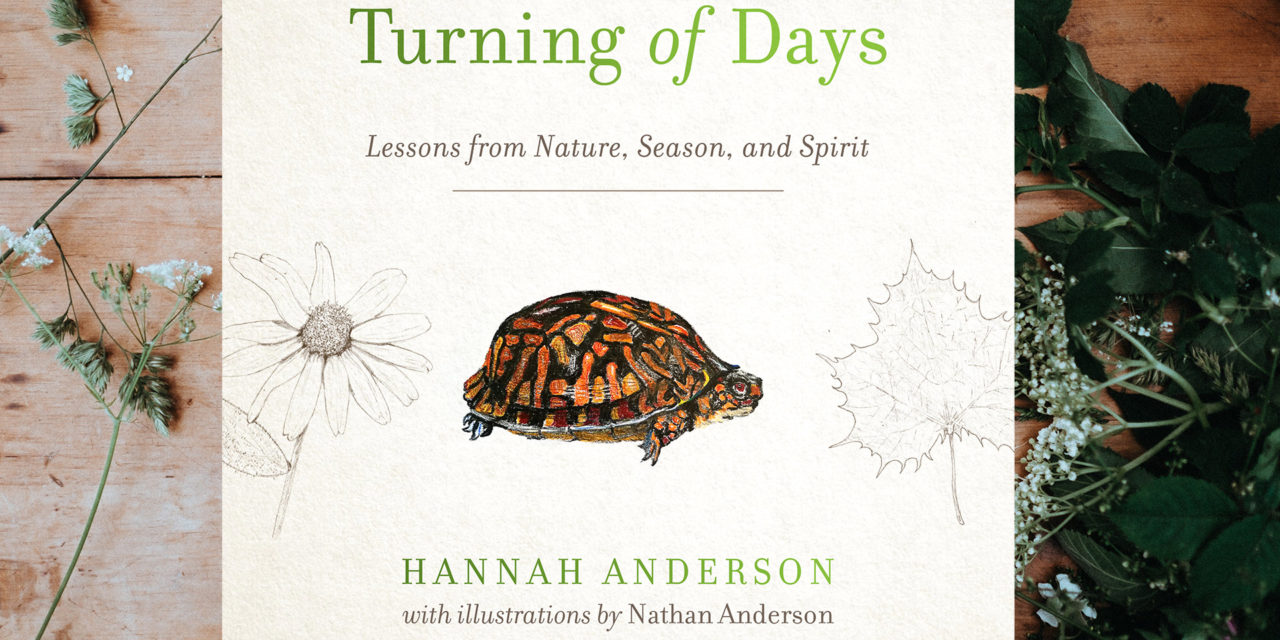Could a book of meditations on the landscape of rural Virginia be relevant to readers in Cascadia? If like many of us in this region you experience God most profoundly in the midst of creation, then the answer is: absolutely.
Hannah Anderson, in her new book Turning of Days: Lessons from Nature, Season, and Spirit, calls our attention to the myriad ways in which God is revealed through both the natural world and the bible. Through the universal and the specific, she contends, creation is always and everywhere communicating to us God’s common and particular grace.
Turning of Days then is a book that speaks to the heart of many of us who call Cascadia our home—we who know firsthand what it means to experience the presence of Spirit in nature all around us. Although the setting for Anderson’s book is the mountains of Virginia (where she lives with her husband, Nathan, also the illustrator of the book), readers in the Pacific Northwest will find much that is familiar and applicable. Her meditative essays explore transcendent themes, even as they consider mundane matters like living sustainability, buying locally, cooking seasonally, and foraging. Most importantly, she encourages us to spend time in nature—in our gardens and backyards, in our neighborhoods, on hiking trails and in national parks—to learn how to become more perceptive observers of the world around us, and to discern the important spiritual lessons that creation has to teach us.
Anderson urges us to slow down, crouch low, and engage all of our senses to be able to see nature in all its finiteness and fullness. She encourages us to cultivate curiosity, and exhorts us even to record the details of our observations in a journal or a sketchbook. Her work challenges us to pay attention to details, but to do so with attention to larger contexts of ecosystems and environments. Most powerfully, Anderson models for us the habits required to truly know a place as she shares her experiences of changing seasons and cycles—all the while remaining in and around her home, her place of connection and relationship in the Blue Mountains of Virginia.
In some ways, the book is shaped as a devotional, with thoughtful and thought-provoking meditations that draw us easily into contemplation and prayer. Each vignette begins with scripture as the devotional focus, and additional scripture and spiritual insights are woven throughout. Interestingly though, Turning of Days also reads as something of a field guide. With the aid of her illustrator husband, Anderson calls attention to subtexts of scientific insights drawn from ecology, meteorology, and astronomy. In this, one wonders if she is perhaps offering a subtle challenge to those who rely so much on the primacy of scriptural revelation that they miss out on the wonders that science too reveals.
In many devotional works that focus on creation, too often the author’s narrow vision is limited by sentimentality, or an overly-romanticized understanding of the natural world. To be sure, Anderson’s writing points us toward what is beautiful and uplifting in the world around us; yet she is honest to speak the truth that, both in Scripture and in nature, we must also contend with brokenness, suffering, and death. In Turning of Days, she does not shy away from those aspects of nature that can be dark, destructive, and unpredictable.
Anderson intrigues and disturbs her readers on the subject of death, for example—using imagery of killing frosts, the rotting carcass of a deer found in a field, the decomposing bodies in a graveyard, or the decay of her garden in the fall. And she makes it achingly personal when she writes about facing her mother’s possible death from a massive heart attack, and the family’s difficult decision whether to remove her from life support.
In all of the themes she explores, such as immortality, faith, redemption, grace, and even God’s judgment and justice, Anderson’s stories are poignant, compelling, and spiritually instructive. She does not shy away from the greater truths of nature that we can learn if we are willing to listen and observe unflinchingly. In scripture too, as in nature, we are tempted to focus on what is easy to hear, and to see only what we want to see. Anderson would challenge us to engage more deeply and honestly with both aspects of God’s revelation—that we might experience transcendence even as we confront brokenness.

